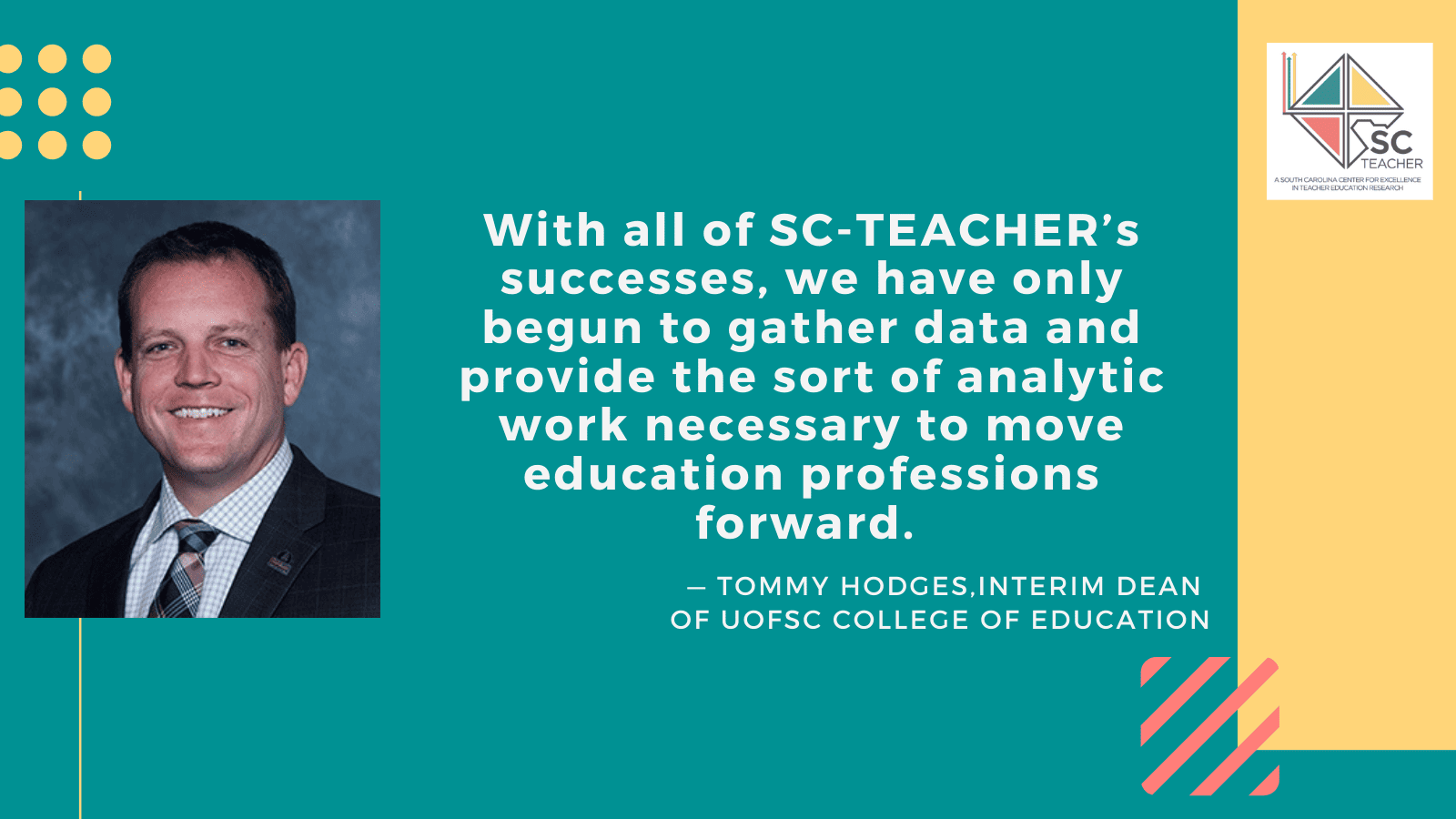In 2018, the South Carolina Education Oversight Committee, through the Commission on Higher Education’s Centers of Excellence competitive grant program, identified “Effective Teacher Training” as the explicit focus for the 2018 – 2019 funding cycle. Topics included:
- Development of a Center of Excellence in Alternative Certification
- Development of a Center of Excellence in Recruitment and Retention of Minority Teachers
- Development of a Center of Excellence in Research of Teacher Education
The message received regarding the intentions for the center for research on teacher education was clear: South Carolina lacked the sort of state-specific data and analysis to help guide policy and practice decisions – at both the state house and schoolhouse. The center should be modeled after centers in other states that have analyzed state and national data in an effort to uncover state-level nuances and drive educational advancement efforts.
The University of South Carolina was uniquely positioned to lead the research of teacher education work given its extensive expertise in psychometrics and analysis, large scale data management, as well as its standing as a Carnegie-rated “Very High Research Activity” institution while holding the largest educator preparation program in South Carolina. Our proposed center, the South Carolina Teacher Education Advancement Consortium through Higher Education Research (SC-TEACHER), established as its primary goal to “understand, through comprehensive research, the impact of teacher education recruitment, preparation and retention activities on teacher effectiveness.” SC-TEACHER sought to understand unique features of South Carolina’s teacher shortage, as well as explore novel educator preparation programs and practices. Following a successful review, SC-TEACHER was launched in Fall 2018.
While SC-TEACHER is housed at the University of South Carolina, its independence is critical. Leveraging the skills and expertise available is important to its success, but its work was, is, and must continue to be independent.
While SC-TEACHER is housed at the University of South Carolina, its independence is critical. Leveraging the skills and expertise available is important to its success, but its work was, is, and must continue to be independent. Partnerships with internal centers, such as the Research, Evaluation and Measurement Center, and the Center for Applied Innovation and Advanced Analytics, provide expert data and analytic skills outside of our educator preparation units. Key external partners, such as the Learning Policy Institute, Education Policy Initiative at Carolina (housed at UNC-Chapel Hill), and the Center for Teaching Quality all bring important guidance, modeling, communication, and design work to SC-TEACHER. Furthermore, these partners provide important alignment to national conversations around teacher pipeline challenges. Lastly, the partnership with the Center for Educator Recruitment, Retention and Advancement (CERRA) has led to key data sharing and co-authorship work.
Thus far, SC-TEACHER has expertly managed available funding to deepen our understandings of the teacher pipeline and drive conversations around needed policy and practice. The Center has engaged with a wide variety of voices via blogs and stories, including practicing educators, education leaders and other experts on key issues. Work Paper Series I provided a wealth of information on baseline efforts towards recruitment, preparation and retention through a series of seven publications that included research papers, infographics and fact sheets. Working Paper Series II represented South Carolina’s first efforts to combine state data with a variety of other data sources for a more comprehensive look at South Carolina’s teacher workforce, including profiles of the South Carolina teacher workforce, school level factors associated with retention, the uniformity of teacher vacancies, and the relationship between teacher retention and talent centered leadership. Finally, SC-TEACHER has demonstrated its ability to take up emergent issues, such as COVID-19, to understand workforce challenges in novel contexts.
With all of SC-TEACHER’s successes, we have only begun to gather data and provide the sort of analytic work necessary to move education professions forward. For instance, SC-TEACHER is piloting a teacher exit survey, modeled after the National Center for Educational Statistics School and Staffing Survey, with partnering districts. This survey should be administered statewide to provide a comprehensive look at drivers for teachers exiting the classroom. When combined with other state-level data, we can truly answer the question of why South Carolina teachers leave the classroom. Additionally, SC-TEACHER is poised to lead South Carolina in the following ways:
- Form and convene a commission to conduct a detailed assessment of the current data infrastructure and construct a unified data upload system
- Design and deliver a much-needed teacher working conditions survey that includes key constructs known to influence the educator labor market. This should be accompanied by a district toolkit so that school districts can unpack data and address key areas for growth
- Design and deliver universal graduate and employer satisfaction surveys
- Reconcile educator preparation program, State Department of Education, district, and SC-TEACHER gathered data
Those interested in the quality and performance of public education must rely on strong data and analytic strategies driven by higher education institutions with the capacity to take up that work.
SC-TEACHER anticipates continued modest funding through FY22, but beyond that date, will need investments to ensure that it can both continue and extend its teacher pipeline policy and practice efforts to address the needs of South Carolina’s children. Those interested in the quality and performance of public education must rely on strong data and analytic strategies driven by higher education institutions with the capacity to take up that work. SC-TEACHER’s future is dependent upon investments made similar to many higher achieving states in such work. The outcomes thus far are a strong demonstration of SC-TEACHER’s efficacy in serving this critical role for South Carolina.
